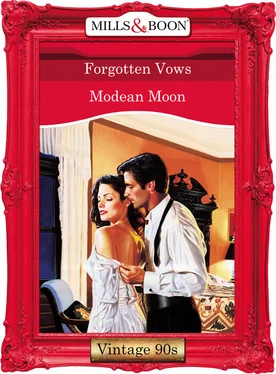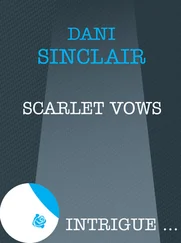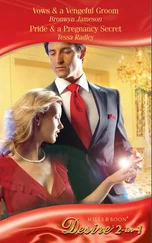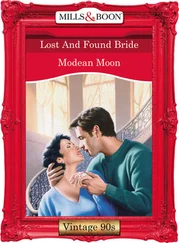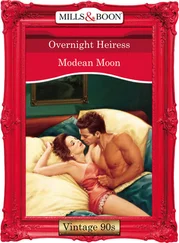Edward stood in the shade of an ancient oak tree watching the woman on the bench. She was lovely—selfcontained, beautiful. His wife. He felt pain twisting inside him again, as demanding and unwelcome as the desire that tightened and readied his body as he let his wayward eyes caress her.
For a few minutes after the older woman left her, Jennie had sat calmly, to all appearances enjoying her solitude. And Jennie in repose was truly beautiful—truly a beautiful sight in any attitude, he corrected. He’d always been aware of that, but the past six months had refined her beauty. He mourned the loss of her hair, but without the weight of its length, it curled softly—a dark chestnut cap to frame her finely drawn features and emphasize dark brown eyes that had always seemed to be alight with the joy of discovery.
A wide-brimmed, floppy hat with ribbon streamers lay on the bench beside Jennie, and she was wearing a softly floral-patterned, flowing dress. Edward felt the pressure of his lips drawn against his teeth. How appropriate, Jennie, he thought. And how much in character for your setting.
Did she really not remember the past? Edward doubted that, just as he doubted she would thank the minister for his well-intentioned interference with her plans for a haven.
He couldn’t fault Reverend Winthrop for his innocence, for being taken in by Jennie’s act. Hell! He’d been deceived, too. And he was experienced in facing the dark side of his fellow creatures. Before Jennie, many had tried; the Carlton money, the Carlton power were too tempting for a greedy person to pass by without at least attempting to gain some. He’d learned that in a harsh and well-remembered school. But until Jennie, no one had succeeded in getting past the defenses he had so painstakingly constructed.
He clenched his hands into fists. Damn it, Jennie! Why? J wanted to give you the world. I wanted to give you my heart.
And that, of course, answered his question. The world, Jennie would have taken. It was Edward she didn’t want. And although that knowledge still had the power to hurt, it had no power to surprise him. He had always wondered how the laughing, delightful, loving woman he’d thought he’d known could love him, reserved, incapable of voicing even the simplest terms of affection or letting himself believe that love truly existed—unless what she felt for him was really only pity.
Well, he’d been wrong. About himself. About her. Love existed. It had trapped him in a hell from which he might never escape. And pity hadn’t controlled Jennie’s actions toward him. Greed had. Why hadn’t he listened to Madeline from the beginning? Madeline was more than a trusted employee, she was the closest thing to a friend he had allowed himself in years.
As though the turbulence of his thoughts had somehow called out to her, the woman on the bench twisted slightly, raised a hand to the back of her neck and appeared to be listening. Edward leaned back against the tree, deeper in the shadows. He would announce himself soon—Winthrop had granted him only a few minutes alone with her—but not yet. He felt strangely debilitated, unsure of himself and of his ability to confront this woman who had betrayed his deepest trust.
Not yet.
Again, Jennie fidgeted on the bench, but this time she turned, too, until she faced him. Looking almost directly at the spot where he stood beneath the tree, she whispered, “Is anyone there?” Then her eyes darkened. She shook her head. “Of course not,” she said in the same tense whisper. She seemed to listen for a moment longer, her hands clenched on the edge of the bench. Then, with a soft cry that could have been a moan or a plea, she rose from the bench like a startled fawn unused to its new legs, and stumbled away from him, along the brick walk.
Edward’s eyebrows drew together in a stunned frown. Jennie was a graceful woman, as light, as ethereal on her feet as a moonbeam. Why then this halting, awkward gait?
He saw the raised bricks of the path where an ancient root had tunneled beneath and lifted them; Jennie apparently did not. With a startled cry, she fell, tumbling from the path and into a bed of some green ground-cover. Edward started toward her, but something about her actions slowed his steps.
Her eyes filled with tears. “Damn,” she moaned, flailing at the ground with tiny balled fists. “Damn! Damn! Damn!”
She took a deep, shuddering breath and knelt there in the plants for a moment, as still as death, then began patting the earth in front of her, as though looking for something. When her hands encountered the brick walk, she crawled forward until she touched the elevated bricks. She patted them three or four times as though validating their existence or confirming their blame for her fall.
She dragged herself to her feet and shuffled carefully onto the path, then stood very still.
And Edward stood equally still, transfixed by the actions of this woman he had once called a wood sprite.
Jennie took one careful step, then stopped. She turned and reached in front of her, groping at space as she took another step.
Edward saw her eyes, troubled, filled with frustration. Tears quivered on her lashes. She bit at her lower lip, and her eyes darkened, the frustration shifting, changing to— to panic?
“Is anyone there?” she whispered again, her hands extended, palms out. “Please. I can feel you here. Please. Please say something.”
And the truth slammed into Edward with the force of the worst pain he had ever felt—the pain of knowing she was truly gone, that after enticing, inviting and winning his love, she had left him.
The truth. Oh, God. Edward bit back the involuntary cry that lodged near his heart.
Jennie Carlton, his wife—Allison Jennifer Long Carlton—the artist whose work Wilbur Winthrop declared had blessed both their lives—Jennie was blind.
She was broken, and even she didn’t know how badly.
In the long hours of the previous night, Edward had plotted what he would do today. He’d promised himself he would see Jennie, show his contempt for her and her larcenous heart, give in to Madeline’s prudent suggestions to file for divorce and then—oh, God—and then find some way to take his much-needed revenge.
But now that he had seen her, Edward knew he could do none of the rest.
Revenge? He remembered Jennie’s eyes—laughing, glowing with what he’d thought was love, lost in contemplation of the work on her latest canvas. He thought of the stacks of completed work that had filled her studio, of the color and beauty with which she had always surrounded herself, and another small piece of him died. He felt that piece shift and tear. Curious, he thought numbly. He had thought himself past grief.
“Please,” Jennie whispered again.
Edward took a deep breath. Revenge? This was beyond anything his fertile mind would have—could have come up with.
“Don’t be alarmed,” he said softly, walking to her side. He reached for her. “Here I am. Take my hand.”
Jennie closed her eyes briefly as she slid her hand into his much larger one and tilted her head to look up toward him, just as she had countless times in the past. Edward watched the panic fade from her beautiful eyes. For a moment, forgetting, Edward expected recognition to flood them. For a moment, he expected her to smile, to whisper his name with that breathless catch of anticipation that had always beguiled him.
Instead, he saw a curious blankness in the depths of her eyes, a subtle, almost unnoticeable lack of focus, and then, finally, faint confusion.
“Do I know you?” Jennie asked.
Did she? Had she ever really known him? “Once,” he said, swallowing back every angry word he’d ever wanted to hurl at her, gentling his voice as he gentled his words.
Читать дальше
